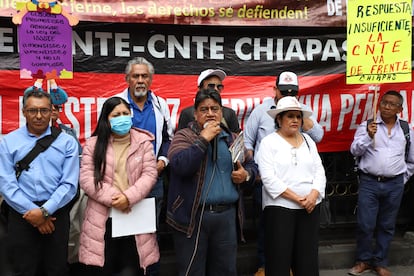The negotiation table between the government and the CNTE teachers fails for the second time after 18 days of strikes.


Negotiations between the government and the teachers of the National Coordinating Committee (CNTE) failed again this Monday afternoon, for the second time in two weeks and after 18 days of a national teachers' strike. The meeting took place, as before , at the Ministry of the Interior and was hosted by the head of the department, along with the Secretary of Education and the Director General of ISSSTE: a significant part of the cabinet, which, however, is failing to reach an agreement with the teachers. "The same rhetoric from the federal authorities is being presented as before," said Eva Hinojosa, the Michoacán sector spokesperson in charge of coordinating the meeting, after the meeting. "We practically reject it because we have that mandate from our colleagues in struggle," she added. "It's a mockery on the part of the government to turn a deaf ear to this plan."
The Ministry of the Interior has confirmed, in a statement, that negotiations remain at the same point as last time, with no additional offers from either party. Nothing new, therefore, regarding the repeal of the 2007 ISSSTE law, which concentrates all of the teachers' battles and for whose abolition the Executive believes there is no budget. "These are definitive proposals based on the maximum financial possibilities available to the Mexican State at this time," the Interior Ministry document states, referring to the last offer made to the union on May 28, which has now been returned to the table. The cabinet has, however, offered to continue discussions this Wednesday at 11:00 a.m., and there is no reason to believe that the Coordinating Committee will not attend.
Despite the deadlock in the talks, the negotiating table appears to be entering a new phase. The government sidestepped the teachers' threat of an electoral boycott , more due to a lack of consensus among the various delegations than because they agreed to tone things down, but the result has been the same: the protests have lost steam in recent days, and fatigue is setting in among authorities, union members, and residents of the capital alike. The willingness to meet for the second consecutive time in just 24 hours demonstrates that everyone is interested in reaching a point as soon as possible that would allow the protest to be lifted, as the rain has not let up in recent days.
The Coordinating Committee, however, has not let up since the beginning of the strike and this Monday received reinforcements from all states. They may want to end the standoff as quickly as possible, but that doesn't mean they'll accept less than what they came seeking: the repeal of the law that replaced solidarity and intergenerational pensions with the system of individual accounts managed by private administrators, or Afores. The government, which agrees with the assessment that this law had a "devastating impact" on public workers, maintains that the public coffers cannot now afford a complete reversal of this system, which has been in place for 18 years.
President Claudia Sheinbaum has offered, in return, a series of proposals that do not entail such a large public investment and that counteract the most harmful aspects of the reform, such as the State supplementing meager private pensions with the welfare pension fund until reaching the average IMSS salary, currently around 17,000 pesos. For the union, this is insufficient, and little is known about the concessions they are willing to make if the negotiation drags on without achieving their goal. Sources from the Coordinator affirm that they will not settle for less than what they achieved last year, during López Obrador's six-year term, from whom they wrested a 13% salary increase, mostly applied to the base salary, with a small portion in benefits. For now, the president has granted them a 9% increase retroactive to January, plus an additional 1% from September, although she has not clarified whether it will be applied entirely to the base salary or to services.
This point, which allows for staggered proposals from both sides (the union is asking for a 100% increase), could be the one that finally breaks the deadlock in the negotiations, given the difficulties in agreeing on a substantive amendment to the regulations approved under the Calderón administration. There is, as yet, nothing new on this front. As always, the final say will lie with the rank and file, whom the Coordinating Committee representatives consult after each meeting with the authorities. In the absence of a measure that satisfies their central demand, it will be fatigue that ultimately determines how long and how far they are willing to continue.
Do you want to add another user to your subscription?
If you continue reading on this device, it will not be possible to read it on the other device.
ArrowIf you want to share your account, upgrade to Premium, so you can add another user. Each user will log in with their own email address, allowing you to personalize your experience with EL PAÍS.
Do you have a business subscription? Click here to purchase more accounts.
If you don't know who's using your account, we recommend changing your password here.
If you decide to continue sharing your account, this message will be displayed indefinitely on your device and the device of the other person using your account, affecting your reading experience. You can view the terms and conditions of the digital subscription here.

Journalist in the Mexico newsroom. Previously, she worked in the National section in Madrid. She is interested in politics and culture, especially literature. She holds a degree in Political Science from the University of Salamanca and a master's degree in Democracy and Government from the Autonomous University of Madrid, with a specialization in Political Theory.
EL PAÍS







